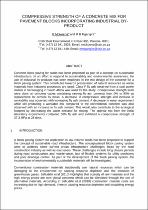 ResearchSpace
ResearchSpace
Investigating the use of isothermal calorimetry for predicting physical properties of cements
JavaScript is disabled for your browser. Some features of this site may not work without it.
- ResearchSpace
- →
- Research Publications/Outputs
- →
- Journal Articles
- →
- View Item
Investigating the use of isothermal calorimetry for predicting physical properties of cements
Isothermal calorimetry is a useful technique for studying the cement hydration process that measures the heat flow of cement paste during hydration. Standard cement properties, such as compressive strength, setting times and compatibility can be derived from calorimetry investigation. This becomes relevant in assisting with monitoring the strength development during construction activities and studying the thermal related behaviour of concrete structures. During this study, the heat generated from the cement hydration reactions was investigated of four different cement types, namely CEM II/B-V 32.5N, CEM II/B-V 42.5N, CEM II/A-M (S-V) 42.5R and CEM I 52.5N. Correlations between the calorimeter results and the (i) initial setting time and final setting time; (ii) 28 day compressive strength and; (iii) fineness, were established for the cement types investigated. With the exception of early-day strength, the results indicated strong correlations between the investigated parameters and the cement hydration curves. This was particularly the case for the setting time of the cements with an R2 value of 0.82 and 0.89 for the initial and final setting times respectively.
Reference:
Mokoena, R., Motau, T. & Mturi, G.A. 2021. Investigating the use of isothermal calorimetry for predicting physical properties of cements. ConcreteBeton, 166. http://hdl.handle.net/10204/12121
Mokoena, R., Motau, T., & Mturi, G. A. (2021). Investigating the use of isothermal calorimetry for predicting physical properties of cements. ConcreteBeton, 166, http://hdl.handle.net/10204/12121
Mokoena, Refiloe, T Motau, and George AJ Mturi "Investigating the use of isothermal calorimetry for predicting physical properties of cements." ConcreteBeton, 166 (2021) http://hdl.handle.net/10204/12121
Mokoena R, Motau T, Mturi GA. Investigating the use of isothermal calorimetry for predicting physical properties of cements. ConcreteBeton, 166. 2021; http://hdl.handle.net/10204/12121.
Sep 2021
Files in this item
Source
ConcreteBeton, 166
Related Items
This item appears in the following Collection(s)
Related items
Showing items related by title, author, creator and subject.
-
Author: Paige-Green, P ; Netterberg, F Date: Jun 2004 The introduction of the SABS EN 197-1 (SANS 50197-1) specification for cements in South Africa resulted in a change in the range of cements available for material stabilization for road layers. An investigation was carried out to assess the ... Read more
-
Author: Netterberg, F Date: Apr 1984 A rapid field test for carbonation of lime, lime-slag, lime-pfa, cement, cement-pfa or cement-slag stabilized pavement material is described. The treated material is simply sprayed with phenolphthalein, phenol red and dilute hydrochloric acid ... Read more
-
Author: Mokoena, Refiloe ; Mgangira, Martin B Date: Jul 2017 Concrete block paving for roads has been proposed as part of a concept on sustainable infrastructure. In an effort to respond to sustainability and environmental awareness, the use of industrial by-products has been employed in the mix design ... Read more
Browse
-
All of ResearchSpace
-
This Collection
Legislation and compliance
General Enquiries
Tel: + 27 12 841 2911
Email: callcentre@csir.co.za
Physical Address
Meiring Naudé Road
Brummeria
Pretoria
South Africa
Postal Address
PO Box 395
Pretoria 0001
South Africa
Copyright © CSIR 2017. All Rights Reserved
Resources on this site are free to download and reuse according to associated licensing provision. Please read the terms and conditions of usage of each resource.







